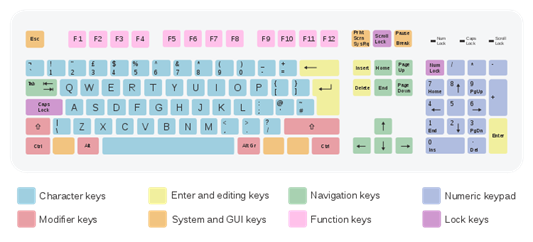PDF chapter test TRY NOW
You can use LibreOffice without needing a pointing device, such as a mouse or trackball, by using its in-built keyboard shortcuts. Tasks as diverse and complex as docking and un-docking toolbars and windows or adjusting the size or location of objects can all be performed with only a keyboard. Although LibreOffice has its own large set of keyboard shortcuts, each component provides others that are specific to its work.
Impress Function Keys:
A function key is a key on a keyboard that can be programmed to cause an operating system (OS) command interpreter or application program to perform specific actions, a form of a soft key.

Shortcut Keys | Effect |
F1 | Open LibreOffice Impress Help. |
F2 | Select the text tool and edit the text. |
Ctrl+F2 | Starts a slide show. |
F3 | Enter group and edit group. |
Shift+F3 | Duplicate object. |
Ctrl+F3 | Exit group. |
F4 | Open Position and Size dialogue. |
F5 | Starts a slide show. |
Shift+F5 | Restart a slide show at the current slide where the slide show was previously stopped at. |
Alt+Shift+F5 | Go to the first slide in a presentation when in Normal view. |
Ctrl+Shift+F5 | Open Navigator. |
F6 | Forward navigation within the on-screen elements without using mouse. |
Shift+F6 | Backward navigation within the on-screen elements without using mouse. |
F7 | Start spelling checker. |
Ctrl+F7 | Open thesaurus. |
F8 | Edit points. |
Ctrl+Shift+F8 | Fit text to frame. |
Shift+F10 | Open context menu of a selected object. |
F11 | Open Styles and Formatting dialog. |
Reference:
https://commons.wikimedia.org/wiki/File:ISO_keyboard_(105)_QWERTY_UK.svg
https://documentation.libreoffice.org/assets/Uploads/Documentation/en/IG4.2/PDF/IG4212-KeyboardShortcuts.pdf
